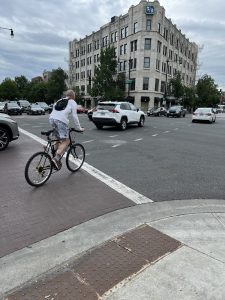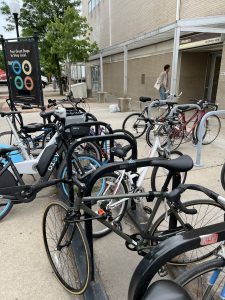The Illinois Supreme Court issued its decision in Alave v. City of Chicago. This case holds implications for the rights and safety of bicyclists in urban areas in Illinois. Our team of bicycle injury lawyers at Zneimer & Zneimer represents bicyclists injured by potholes and has litigated issues of municipal liability when a person is injured on a street, sidewalk, or an alley. Illinois law makes a distinction between intended and permitted user and does not recognize right of recovery for users on the road who are considered permitted but not intended. Thus a bicyclist who is not on a bike path or bike designated street does not have a case against the city for damages caused by defect such as a pothole on the street because the law deems such bicyclists permitted but not intended users. Permitted users have a cause of action.
In the Alave case, Clark Alave was riding his own bicycle near a Divvy bicycle sharing station when he hit a pothole, resulting in permanent injuries. The complaint alleged that the City was negligent in its maintenance of the roadway, which led to the formation of the pothole that caused Alave’s accident. The City, in its defense, argued that the specific roadway where the accident occurred was not intended for bicycle use, as it was not a designated bicycle route and lacked signs or markings for bicyclists.
Initially, the City of Chicago won a motion to dismiss, arguing that Clark Alave was a permitted user only and that the city is immune from liability for his injuries. The appellate court overturned the circuit court’s decision, considering several factors. According to the court, City ordinances against sidewalk cycling implied that cyclists were expected to use the road. The presence of a Divvy bike station suggested the city’s endorsement of road use by cyclists in that area.
However, the Illinois Supreme Court ultimately reversed the appellate court’s decision, focusing on the lack of specific markings or signs indicating intended bicycle use on the road in question. The Illinois Supreme Court focused on determining whether the plaintiff, a bicyclist, was an intended user of the roadway where he was injured. The Court examined the roadway’s physical characteristics, signage, and markings to assess the city’s intent. Ultimately, the Court concluded that without specific indicators like bike lanes or signs denoting intended bicycle use, the bicyclist was not an intended user under the Local Governmental and Governmental Employees Tort Immunity Act, thus negating the city’s liability for the plaintiff’s injuries. This decision highlights the complexities surrounding municipal liability and road safety for cyclists. It emphasizes the need for clear indications of intended road use for bicyclists, such as designated bike lanes or signs.
The Illinois Supreme Court followed its precedent in Boub v. Township of Wayne, which established that the intended use of a roadway is determined by physical manifestations such as signs, markings, and other indications. This precedent was crucial in determining whether a bicyclist is considered an intended user of a roadway, impacting the municipality’s duty to maintain the road safely for that use. The Court’s analysis in Alave v. City of Chicago heavily relied on this precedent to assess the intended use and corresponding municipal responsibility.
This case illustrates the evolving nature of municipal liability and the interpretation of intended use in the context of modern urban transportation infrastructure, especially with the advent of shared transportation modes like bike-share programs. The court’s decision reflects an understanding of the practical realities of urban bicycling and the expectations set by the presence of bike-share stations. Alave v. City of Chicago underscores the unfavorable legal landscape for bicyclist safety and municipal responsibility. As advocates for bicyclist rights, Zneimer & Zneimer remains dedicated to navigating these legal challenges and advocating for safer, more inclusive roads. The bike injury lawyers of Zneimer & Zneimer has handled cases similar to Alave have dealt with
If you have been injured in a bicycle accident, Zneimer & Zneimer is here to help. With our deep understanding of bicycle law, we are equipped to guide you through the legal process and advocate for your rights. Contact us for a FREE consultation to explore your options. We are conveniently located at 4141 N. Western Ave. in Chicago.
 Chicago Accident Lawyer Blog
Chicago Accident Lawyer Blog



